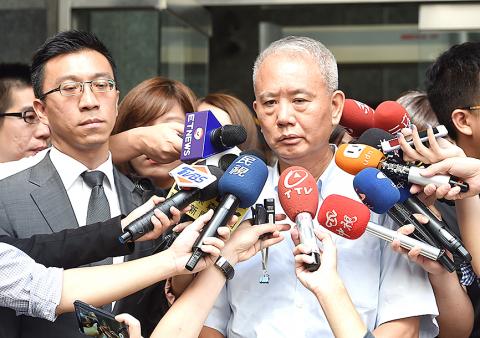The Taichung branch of the Taiwan High Court yesterday overturned an earlier not-guilty ruling for former Ting Hsin Group (頂新集團) senior executive Wei Ying-chun (魏應充) and sentenced him to 15 years in jail for his part in a tainted cooking oil scandal exposed in 2015.
The court found Wei and three other former executives of Ting Hsin and its affiliates — Chen Mao-chia (陳茂嘉), Chang Mei-feng (常梅峰) and Yang Chen-yi (楊振益) — guilty of fraud and contraventions of the Act Governing Food Safety and Sanitation (食品安全衛生管理法).
Chen was handed a six-and-a-half year sentence, with an additional five-year term that can be commuted to a fine, while Chang received a five-and-a-half year sentence, with an additional three-year term that can be commuted to a fine, and Yang was given a seven-year sentence, with an additional 18-month term that can be commuted to a fine.

Photo: Liu Hsin-de, Taipei Times
The court also imposed a fine of NT$250 million (US$8.44 million) on Ting Hsin for its role in the scandal.
It was the second ruling in the case and can be appealed.
Ting Hsin’s legal team, headed by attorney Yu Ming-hsien (余明賢), said that it would file an appeal.
“I cannot accept this ruling. The court did not consider most of the evidence we presented,” Yu quoted Wei as saying in a statement. “I am very disappointed about such a heavy punishment for things that I did not do. We will certainly appeal, as I am innocent of the charges.”
The decision was widely hailed by consumer groups and food safety advocates, although many people were displeased that the four would be permitted to pay fines instead of serving part of their prison terms and that the punishment was less than the maximum 30-year sentence for breaching food safety laws sought by prosecutors.
Amid a public furor over a series of tainted food scandals from 2013 to 2015, the Changhua District Court’s original not-guilty ruling in November 2015 sparked a firestorm of outcry and protest, with much criticism directed at the judges.
The key to overturning the first ruling was a determination by the High Court judges that the base material for the cooking oil was intended for animal feed, which the company processed with unapproved additives, invalidating Ting Hsin’s claim that the final product was safe for human consumption.
“Ting Hsin imported the base material from a Vietnamese company, which provided a certification document by [Vietnamese inspection service provider] Vinacontrol that lacked qualification standards to indicate the oil was safe for human consumption,” the High Court ruling said. “Ting Hsin claimed it adhered to Taiwan’s hygiene and health standards for processing fats and cooking oil, but that does not prove the final product was safe for human consumption.”
“In the simplest terms, what humans eat is different from what animals eat. You cannot take animal feed and pass it off as food for humans,” Taichung High Administrative Court Chief Judge Chiang Te-chien (江德千) said, explaining the ruling. “Even if animal feed is processed and refined, you cannot say it is safe for human consumption.”
“When processing or manufacturing food, the use of additives not approved by government agencies can be deemed as falsifying or adulterating the product, which contravenes provisions of the Act Governing Food Safety and Sanitation, regardless of whether the product is safe for human consumption,” he said.

A Chinese aircraft carrier group entered Japan’s economic waters over the weekend, before exiting to conduct drills involving fighter jets, the Japanese Ministry of Defense said yesterday. The Liaoning aircraft carrier, two missile destroyers and one fast combat supply ship sailed about 300km southwest of Japan’s easternmost island of Minamitori on Saturday, a ministry statement said. It was the first time a Chinese aircraft carrier had entered that part of Japan’s exclusive economic zone (EEZ), a ministry spokesman said. “We think the Chinese military is trying to improve its operational capability and ability to conduct operations in distant areas,” the spokesman said. China’s growing

Taiwan yesterday denied Chinese allegations that its military was behind a cyberattack on a technology company in Guangzhou, after city authorities issued warrants for 20 suspects. The Guangzhou Municipal Public Security Bureau earlier yesterday issued warrants for 20 people it identified as members of the Information, Communications and Electronic Force Command (ICEFCOM). The bureau alleged they were behind a May 20 cyberattack targeting the backend system of a self-service facility at the company. “ICEFCOM, under Taiwan’s ruling Democratic Progressive Party, directed the illegal attack,” the warrant says. The bureau placed a bounty of 10,000 yuan (US$1,392) on each of the 20 people named in

Nine retired generals from Taiwan, Japan and the US have been invited to participate in a tabletop exercise hosted by the Taipei School of Economics and Political Science Foundation tomorrow and Wednesday that simulates a potential Chinese invasion of Taiwan in 2030, the foundation said yesterday. The five retired Taiwanese generals would include retired admiral Lee Hsi-min (李喜明), joined by retired US Navy admiral Michael Mullen and former chief of staff of the Japan Self-Defense Forces general Shigeru Iwasaki, it said. The simulation aims to offer strategic insights into regional security and peace in the Taiwan Strait, it added. Foundation chair Huang Huang-hsiung

PUBLIC WARNING: The two students had been tricked into going to Hong Kong for a ‘high-paying’ job, which sent them to a scam center in Cambodia Police warned the public not to trust job advertisements touting high pay abroad following the return of two college students over the weekend who had been trafficked and forced to work at a cyberscam center in Cambodia. The two victims, surnamed Lee (李), 18, and Lin (林), 19, were interviewed by police after landing in Taiwan on Saturday. Taichung’s Chingshui Police Precinct said in a statement yesterday that the two students are good friends, and Lin had suspended her studies after seeing the ad promising good pay to work in Hong Kong. Lee’s grandfather on Thursday reported to police that Lee had sent